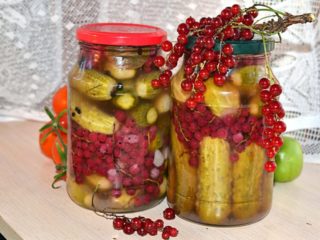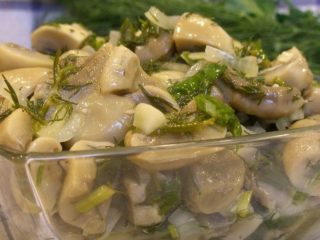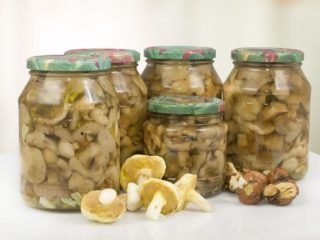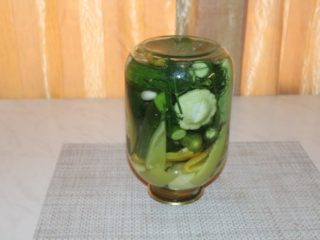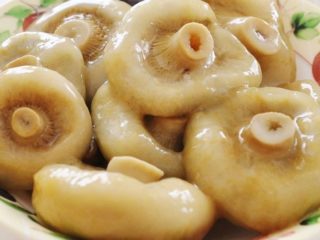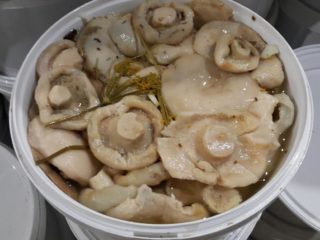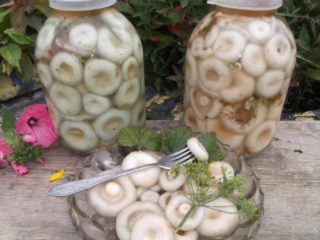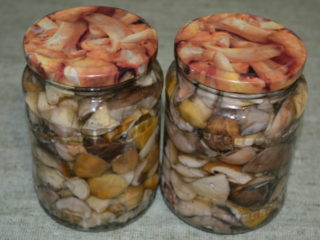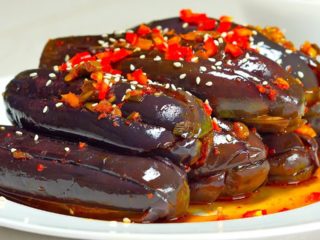Content
Bulgarian zucchini for the winter is made according to the classic recipe, spices are added to the marinade, and preserved along with tomatoes and peppers. The product is characterized by a long shelf life and high nutritional value. It can be called one of the favorite snacks on the everyday and holiday table.
Cooking features
Bulgarian zucchini differs in its structure from other recipes for preparing pickled vegetables for the winter, in that the pieces are crispy and have a pronounced taste. The raw materials do not undergo long-term heat treatment; they are not poured with boiling water several times for sterilization. The composition of the marinade is as close as possible to canned vegetables according to Bulgarian recipes.
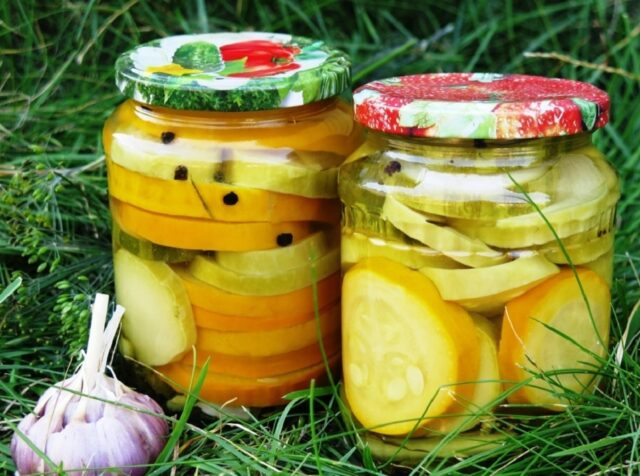
For preservation, fruits of any stage of ripeness are taken
Selection and preparation of vegetables
Any type of zucchini is suitable for Bulgarian recipes; preparations for the winter are made from young and already fully ripe ones.
Mandatory requirements for the quality of raw materials:
- the peel is uniformly colored, without black spots;
- there are no soft areas on the surface;
- there are no signs of rotting;
- Zucchini has virtually no flavor. If you smell fermentation, the inside is of poor quality.
Treatment:
- The fruits are washed under the tap and moisture is removed from the surface with a napkin.
- In young ones, the place of the stalk and receptacle is cut off. If there are deep scratches or dark spots on the surface, they are carefully cut off in a thin layer and the fruit is processed along with the peel.
- When ripe, the top layer is removed and the seeds are removed.
- Overripe ones are processed to remove the peel and seeds with fibers.
Shaped depending on the recipe. In the classic version, Bulgarian-style zucchini is preserved in thin rings for the winter. In an appetizer with tomatoes, cut into cubes or slices.
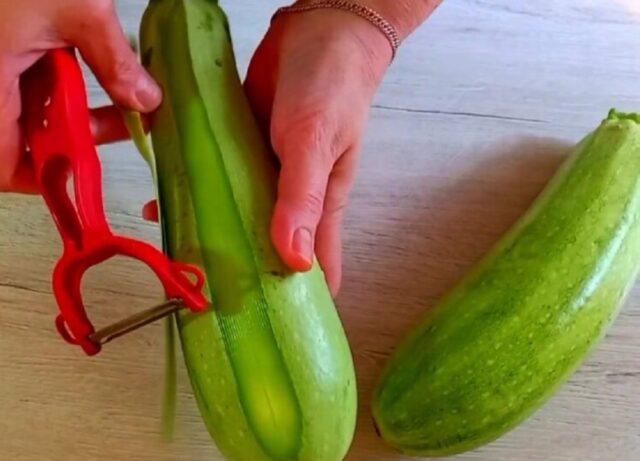
The peel is removed in long thin strips so that the surface of the pulp is even.
Preparing containers
A guarantee of long-term storage will be packaging the product stored for the winter in pre-treated containers. Bulgarian zucchini is preserved in small glass jars of 0.5-1 liters. They are washed with baking soda, rinsed with hot water and sterilized. You can do this in several ways:
- In the microwave. Pour a little water into the jars so that the liquid covers the bottom (approximately 0.5 cm). Place in the microwave, turn on maximum mode. Leave until the moisture evaporates and the container becomes dry.
- In a slow cooker. Pour water into the bottom of the bowl, install a grid for steaming, place containers on it, and turn on the device to any mode. When there is no moisture left on the walls, remove the container.
- Steam treatment. The principle is the same as in a multicooker. Pour water into the pan, place a wire rack, and place the container on it, neck down.
- Sterilization in the oven. Leave the containers for 15 minutes at a temperature of 1700C.
Metal lids must also be disinfected. They are filled with water and boiled for 10-15 minutes.
Recipes for pickled zucchini in Bulgarian for the winter
In the options for processing vegetables in Bulgarian proposed below, the weight of already processed zucchini is indicated. Another feature of the recipes is the ratio of sugar and vinegar in the marinade; they are used in equal quantities.
Classic recipe for canned zucchini in Bulgarian
Ingredients:
- zucchini – 3 kg;
- sugar – 250 g;
- vinegar (6%) – 250 ml;
- salt – 2 tbsp. l.;
- water – 2 l;
- bay leaf – 4 pcs.;
- horseradish root – ¼ part;
- garlic – 1 head;
- peppercorns – 25 pcs.
The sequence of canning zucchini in Bulgarian for the winter:
- Horseradish root is crushed in any available way.
- Garlic is crushed with a special device.
- Zucchini is formed into rings 1 cm thick.
- Water is poured into the pan. Add sugar, salt, vinegar.
- When the marinade boils, add the chopped vegetables and bay leaf.
- Boil: young zucchini - 5 minutes, ripe - 8 minutes, overripe - 12 minutes.
- Take out the rings of vegetables and fill the container with them.
- Add horseradish and chopped garlic to the marinade and let it simmer for another 5 minutes. Pour into jars.
The containers are sealed, turned over onto lids and the preparation is insulated for the winter until it cools completely.
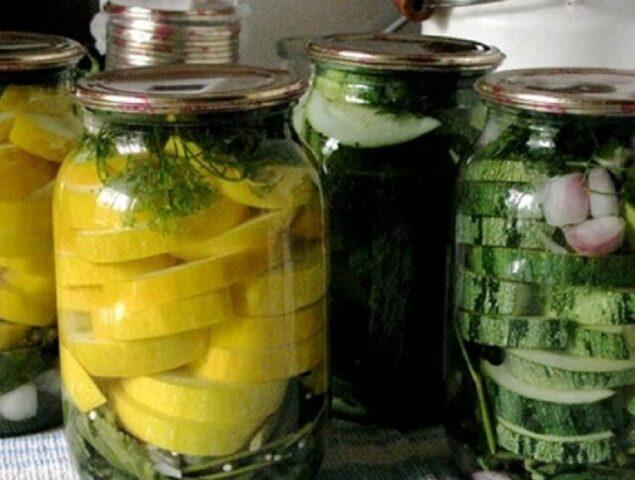
The output will be 4 liters of finished product.
Spicy zucchini in Bulgarian style
Fruits with fully ripened seeds are ideal for this recipe. The peeled zucchini is cut into rings, and the core is squeezed out with a glass of a suitable size, and only then the raw materials are weighed.
Ingredients:
- zucchini – 2 kg;
- garlic – 6 cloves;
- water – 1.3 l;
- vinegar – 150 ml;
- sugar -150 g;
- dill seeds – 1 tsp. (can be replaced with greens);
- salt – 1.5 tbsp. l.;
- allspice and black pepper – 8 peas each;
- bay leaf – 5 pcs.;
- blackcurrant and cherry leaves - 4 pcs.
How to make a spicy preparation for the winter in Bulgarian:
- Water is poured into the pan. Place all the ingredients for the marinade (except garlic).
- Boil for 5 minutes. Pour out the chopped vegetables. Cook for another 7 minutes.
- Place the vegetables in containers, distribute the leaves and chopped garlic into rings evenly into the jars.
- The boiling marinade is poured over the workpiece. Cover with lids.
The containers are turned over and carefully insulated. The product must cool for at least two days.
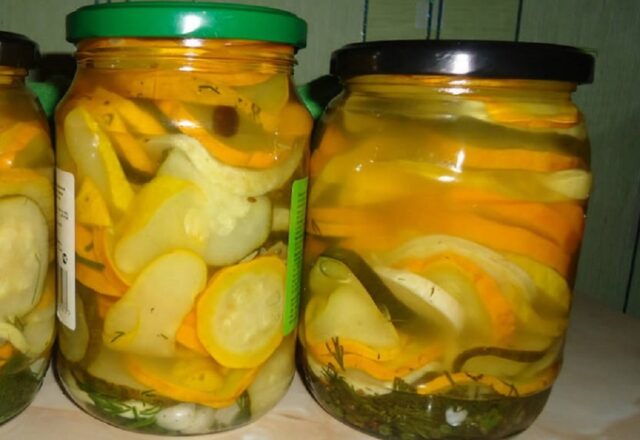
The aroma and taste of the preparation is spicy, well-defined; for lovers of spicy snacks, you can add hot pepper to the composition
Bulgarian zucchini with peppers and tomatoes
This Bulgarian recipe makes delicious zucchini for the winter. Contains hot pepper. It can be excluded if preference is given to a sweeter preparation.
Components:
- tomatoes – 1 kg;
- bell red pepper – 500 g;
- bitter – 1 pod;
- zucchini – 3 kg;
- sunflower oil – 250 ml;
- vinegar – 200 ml;
- salt – 1.5 tbsp. l.;
- garlic – 2 medium heads;
- sugar – 200 g.
How to prepare for the winter:
- Peppers are cleared of seeds. Bitter is cut into rings, sweet - into strips 1.5 cm wide and 3-5 cm long.
- Zucchini is shaped into cubes.
- Garlic is crushed or grated.
- Tomatoes are dipped in hot water and the skins are removed. You can extract juice from them using a juicer or cut into slices.
- Oil is poured into the cooking container. Blanch tomatoes or juice from them for 15 minutes.
- Sugar and salt are added to the tomatoes.
- Then add zucchini and pepper. Boil with the lid closed over low heat for 25 minutes.
- Add garlic and vinegar. Cook for another 7 minutes.
The boiling mass is placed in containers and sealed. Insulate for a day.
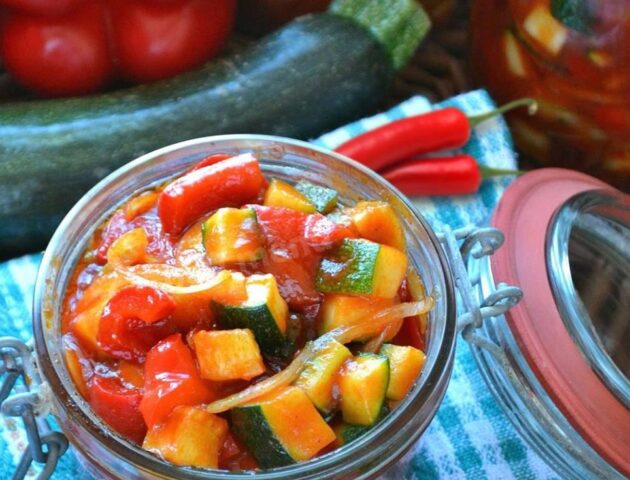
The product tastes like lecho
Bulgarian zucchini for the winter without sterilization
Recipe for four liter jars:
- zucchini – 3 kg;
- salt – 80 g;
- water – 2 l;
- dill - 2 umbrellas;
- garlic – 12 cloves;
- sugar – 250 g;
- bay leaf – 5 pcs.;
- vinegar (9%) – 250 ml;
- black pepper – 24 peas.
How to make Bulgarian zucchini for the winter:
- Vegetables are cut into circles no more than 1 cm wide.
- Dill umbrellas and garlic cloves are placed in jars.
- In a saucepan, combine water, bay leaf, sugar, pepper, salt, boil for 3 minutes.
- Pour in vinegar and add zucchini, cook for 5 minutes. Place in jars and pour boiling marinade over them.
The containers are sealed. The heat treatment is short, so the container must be carefully insulated to allow it to cool for at least 48 hours.
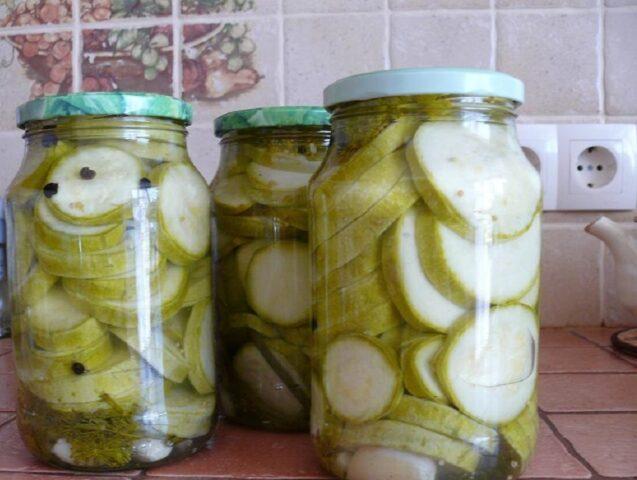
Pieces of vegetables, prepared in a quick Bulgarian way, completely retain their chemical composition and elastic pulp.
Storage periods and rules
Bulgarian canned vegetables can be stored for up to three years. The conditions for keeping the pickled product are standard, as are the case for most winter preparations that contain vinegar. Banks are placed in a basement or pantry, an unheated room. Air humidity should be minimal, and temperature should not exceed +8 0C. Bulgarian-style vegetables can be stored in a closed loggia if there are no readings below zero there in winter.
Conclusion
Bulgarian zucchini for the winter is one of the popular ways to process vegetables. The product is not subjected to long-term sterilization, therefore it completely retains all vitamins and useful chemical elements. Thanks to the preservative (vinegar), it can be stored for a long time without losing the sweet and sour taste and crispy structure of the pulp.
